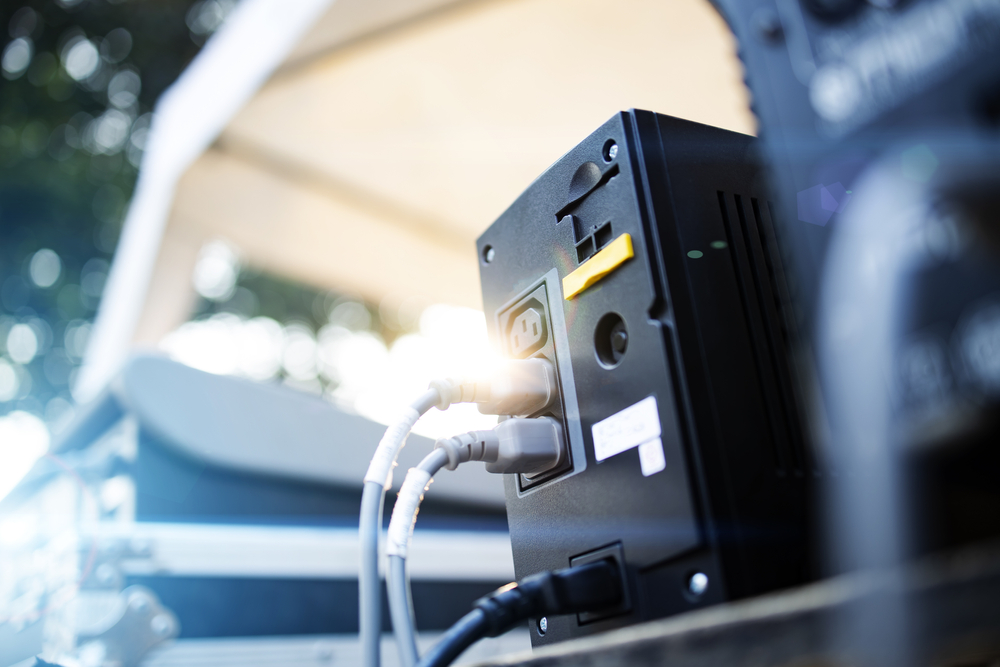What is a UPS?
Firstly, what is a UPS? Well, the acronym stands for Uninterruptible Power Supply.
The easiest way to describe a UPS would be to say that it’s “A battery that keeps your equipment on when there is a power cut” but that does oversimplify what the UPS is for and doesn’t acknowledge some of its most important features.
In addition to providing some equipment powered on when a power outage is in place, A Uninterruptible Power Supply (UPS) also protects sensitive equipment from several potentially damaging power issues.
How UPS Systems Work
A UPS system works by providing a backup power source to connected equipment in the event of a power outage or failure. At its core, a UPS system consists of three main components: a battery, an inverter, and a charger. When utility power is available, the charger keeps the battery fully charged, while the inverter converts the DC power stored in the battery to AC power, which is then supplied to the connected equipment. In the event of a power outage, the inverter seamlessly draws power from the battery, ensuring that your equipment continues to operate without interruption.
Beyond just providing backup power, UPS systems also play a crucial role in power conditioning. They regulate the voltage and frequency of the output power, ensuring it remains clean and stable. This is particularly important for sensitive equipment, such as computers and medical devices, which require a consistent and reliable power supply to function correctly.
Additionally, UPS systems offer surge protection, safeguarding your equipment from power surges and spikes. This feature is vital for devices that are highly sensitive to power fluctuations, such as telecommunication equipment and computers, ensuring they remain protected from potential damage.
Types of UPS Systems and Their Benefits
There are several types of UPS systems available, each designed to meet different needs and applications. The most common types of UPS systems are:
- Standby UPS: This is the most basic type of UPS system, providing backup power only when utility power fails. It’s an ideal choice for small applications, such as home offices and small businesses, where cost-effectiveness is a priority.
- Line Interactive UPS: This type of UPS system not only provides backup power but also regulates the voltage and frequency of the output power. It’s suitable for medium-sized applications, such as small to medium-sized businesses, offering better power conditioning and regulation compared to standby UPS systems.
- Online UPS: The most advanced type of UPS system, online UPS systems provide continuous power conditioning and backup power. They are designed for large applications, such as data centres and hospitals, where the highest level of power conditioning and backup power is required.
Each type of UPS system has its own set of benefits. Standby UPS systems are the most cost-effective, making them suitable for less critical applications. Line Interactive UPS systems offer enhanced power conditioning, making them a better choice for environments with moderate power quality issues. Online UPS systems provide the highest level of power protection, making them indispensable for critical applications where continuous power is essential.
What do they protect against?
A UPS device protects against many different forms of electrical problem, including power outages. The most common is power outage (power cut, Blackout). These power outages could be caused by something local to the building, or something wider, such as supplier outages or localised cabling issues.
Other problems that they protect against include voltage spikes and surges (where the power sent to the building by the provider momentarily increases, spikes describe when the increase is for very short periods, thousandths of a second, whereas surges are longer).
Then there are times where there is a reduction of voltage, where the power sent to the building by the provider momentarily decreases, again several terms can be used, usually reflecting the duration such as “sags” (short) and “brown outs” (longer) often leading to devices restarting & changes in mains frequency.
In my IT network, what should I protect?
UPS devices can be used to protect many different IT related devices. The most important thing to protect is your server (or servers) if you have one. The server(s) is usually where your data is kept and is therefore the most mission critical part of your network. If the server was to ‘power off’ without being shutdown correctly, it could result in loss of data – either partial or complete loss. Of course, you might have backups of that data from the previous day or week, but it’s unlikely that you would have an up to the minute copy of the data. In addition, it could take a long time to get the system back up and running if you suffered from this kind of data corruption.
A reliable battery backup in your UPS system ensures seamless power during interruptions, protecting critical equipment from potential data loss and damage.
You may also want to consider protecting other crucial network devices with a UPS. Your firewall and network switches for example should be covered to give them the best chance of continuing to operate after a power problem of some kind.
Choosing the Right UPS System for Your Needs
Selecting the right UPS system for your needs involves considering several key factors:
- Power Requirements: Start by determining the total power requirements of your equipment. Choose a UPS system that can handle the load, ensuring it can provide sufficient backup power during an outage.
- Type of Equipment: Consider the type of equipment you need to protect. For instance, sensitive medical equipment may require a UPS system with high power conditioning and regulation capabilities.
- Budget: Your budget will play a significant role in your decision. Remember that the cost of a UPS system includes not just the initial purchase price but also ongoing maintenance and replacement batteries.
- Scalability: Think about the future growth of your application. If you anticipate expansion, choose a UPS system that can be easily scaled to meet increasing power demands.
By carefully evaluating these factors, you can select a UPS system that provides the right level of protection and meets your specific needs.
UPS Battery Life and Replacement
UPS batteries have a finite lifespan and will need to be replaced periodically to ensure your UPS system continues to function effectively. The lifespan of a UPS battery depends on several factors, including the type of battery, the depth of discharge, and the operating temperature.
Lead acid batteries, commonly used in UPS systems, typically have a lifespan of around 3-5 years. However, this can vary based on operating conditions. It’s generally recommended to replace UPS batteries every 3-5 years or as advised by the manufacturer.
When it’s time to replace your UPS batteries, it’s crucial to choose batteries that are compatible with your specific UPS system. Follow the manufacturer’s guidelines for replacement procedures to ensure the system continues to operate correctly.
Regular maintenance is also essential to keep your UPS system in top condition. This includes checking the battery voltage, cleaning the system, and performing firmware updates. By staying on top of maintenance, you can ensure your UPS system provides reliable power protection for years to come.
Why are you telling us about this now?
With the current economic crisis comes the potential of problems with the energy supply market. Many experts are predicting power outages over the winter of 2022/23 and you are therefore more at risk now, than you have been previously. You can check out a couple of related articles at the BBC https://www.bbc.co.uk/news/business-63155827 and the Guardian https://www.theguardian.com/business/2022/oct/06/national-grid-warns-households-could-face-three-hour-power-cuts-this-winter to find out more.
How much do they cost?
It’s impossible to give an accurate cost without considering exactly what type of equipment, server (or servers) that you have in place. It’s important that your equipment is correctly assessed to ensure that the UPS device is indeed capable of handling issues when they arise.
ESP can offer to assess your needs free of charge if you are in the South Yorkshire area or further afield if you are already an IT Support Customer using our Sheffield based IT services.

How do I ensure my existing UPS baterry backup is working?
You could do something simple – just turn off the power in the server room and it will tell you whether the device is working – but that’s VERY risky! Why not do something less risky? Ask your IT provider (or ESP!) to complete a check on your UPS device to make sure it’s fully operational and protecting your devices in case something goes wrong!
Feel free to reach out to us via sales@espprojects.co.uk or by calling 0330 2020 101 if you would like more information or a free consultation.

